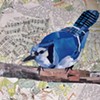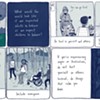Published May 4, 2021 at 10:00 a.m.
In the early days of the pandemic, time wasn't normal; it bent around unknown corners, broke into FaceTime fragments and sometimes stopped altogether, denying some the chance to say goodbye.
More than a year later, we're all still in it. I struggle to remember what day it is, and it will likely take a long time before I can see 2020 clearly. Instead, I'll describe what I can see clearly: the person I was right before the pandemic started. Passionate and focused, I was on the ledge of familiarity, ready to push off and start my own business as a postpartum doula.
I had left a job in journalism to pursue a lifelong desire to work with birthing people and families. I completed a lactation counselor course and became a volunteer birth doula at the University of Vermont Medical Center, invigorated by the program's aim to offer birth support to everyone who wants it.
As I learned about the disparities in maternal health, I decided to start training as a postpartum doula to address that gap in care. This happened as our country was being thrashed by disinformation, divisiveness and racial unrest. That the blatant violence and prevalence of white supremacists shocked me revealed my glaring white privilege — and how I had lived with the choice to opt in or out of anti-racist work.
Amid this disorientation I clung to basic comforts, like the sun rising in the morning. And despite being nervous about starting a business, the clarity of my path was a beacon. My intuitive draw to birthing people and babies laid the foundation, the United States' rising maternal mortality rate was a catalyst, and the desire to change that was my goal.
Just as I was about to take the leap, the pandemic hit. It stretched its tentacles across the globe, connecting us as it forced us into isolation. My partner was furloughed over the summer, and I spent many nights lying awake, making contingency plans. How many months could we manage without income? We could sell the house if we needed to. We could move in with family. It was the first of many times that the pandemic would force me to strip life down to the essentials and realize just how much I'd been accustomed to having.
At the hospital, the volunteer doula program paused to develop COVID-19 protocols. The program's founder worked hard to get doulas back into the hospital, and when it was safe, we were the first volunteers in the state allowed to resume our work. Essential workers didn't have the choice to stay home. And I'd always said doula work was undervalued and should be deemed essential. So I decided to jump back in, providing eye contact and words of support from behind a mask and full-face shield. I helped to navigate FaceTime calls so that family could virtually be in the room, and as people exhaled through powerful contractions, I talked myself through the omnipresent fear that anyone could transmit the invisible, deadly virus.
Around this time, I was asked to do a virtual presentation on implicit bias for the next group of volunteer doulas. I agreed, despite feeling unqualified. I did hours of research, during which I came up against my own unconscious biases. I started to question my understanding of the very words I was using: inclusivity, racist, disparity, inequity. And I reexamined whether I was bringing action to my convictions. The coming months would send me deeper into this work.
I knew studies showed that doula support improves birth and postpartum outcomes, but I didn't know the history of the work — that women have supported people through and after birth long before the term doula (from ancient Greek, meaning "female slave") was coined in 1973 by a white anthropologist. And that the disappearance of these family and community birth workers is tied to the eradication of Black granny midwives, who were systematically removed as modern obstetrics took control of birthing spaces. I knew that Black women were dying from pregnancy and childbirth-related illnesses at a disproportionate rate but learned that studies show this is because of racism, not race.
I realized that, as a white doula, advocacy has to be woven into my work. Every time I cite maternal health statistics that reflect Black pain, I must counter it with action steps. This includes donating to organizations that work to increase the number of Black and brown doulas and midwives, and urging representatives to support the Black Maternal Health Momnibus Act and legislation that offers doula services as a Medicaid benefit. I resolved to do a lot more listening — to birth justice organizations, anti-racist educators and the experiences of diverse birthing people. And I teamed up with other doulas to form a collective that is working to offer affordable community support.
I saw my first postpartum clients in the middle of the pandemic. I mask up and cook them food, soothe their babies through the night, listen to their fears, and encourage them to follow their intuition. I can't share their stories, because they're not mine to tell. But I can speak to the challenges of new parents right now: the physical isolation of being removed from society and support when parents need them most; the inability to see family, or the heartbreak of not wanting to when beliefs on COVID safety measures don't align.
While the pandemic has defined life's most basic needs — to take care of ourselves and our community — it's also made me question so many things, including my resolve when the path seems incredibly clear. That feeling is comforting, like knowing the sun will rise in the morning. But sometimes comfort isn't the goal.
Sometimes the goal is being able to sit with discomfort and listen to what it might be telling you, about what you think you know and how you function in the world. To listen when it tells you to go deeper into your life and your work, even when time stops making sense, even when you lose your direction, even when the world goes dark.
This article was originally published in Seven Days' monthly parenting magazine, Kids VT.
Speaking of...
-

'In This Together': A Doula and Birth Photographer Has Her Third Baby at Home
Mar 12, 2024 -

Summit Not Required: Reconsidering the Race to the Top
Aug 22, 2023 -

Vermont Visionaries: Greer Sargeant, Postmodern Doula
May 23, 2023 -

Use Your Words: A Mom and Early Childhood Educator Explains What She Learned About Managing Her Fear of the Climate Crisis
May 23, 2023 -

Video: Adrian Tans Draws an Audience With Chalk Art on the Woodstock Town Smiler
May 18, 2023 - More »
Comments
Comments are closed.
From 2014-2020, Seven Days allowed readers to comment on all stories posted on our website. While we've appreciated the suggestions and insights, right now Seven Days is prioritizing our core mission — producing high-quality, responsible local journalism — over moderating online debates between readers.
To criticize, correct or praise our reporting, please send us a letter to the editor or send us a tip. We’ll check it out and report the results.
Online comments may return when we have better tech tools for managing them. Thanks for reading.














































